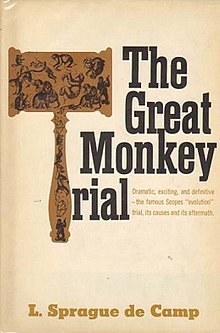The Scopes trial, formally The State of Tennessee v. John Thomas Scopes, and commonly referred to as the Scopes Monkey Trial, was an American legal case from July 10 to July 21, 1925, in which a high school teacher, John T. Scopes, was accused of violating Tennessee's Butler Act, which had made it illegal for teachers to teach human evolution in any state-funded school. The trial was deliberately staged in order to attract publicity to the small town of Dayton, Tennessee, where it was held. Scopes was unsure whether he had ever actually taught evolution, but he incriminated himself deliberately so the case could have a defendant.

Lyon Sprague de Camp was an American author of science fiction, fantasy and non-fiction literature. In a career spanning 60 years, he wrote over 100 books, including novels and works of non-fiction, including biographies of other fantasy authors. He was a major figure in science fiction in the 1930s and 1940s.

Henry Louis Mencken was an American journalist, essayist, satirist, cultural critic, and scholar of American English. He commented widely on the social scene, literature, music, prominent politicians, and contemporary movements. His satirical reporting on the Scopes Trial, which he dubbed the "Monkey Trial", also gained him attention. The term Menckenian has entered multiple dictionaries to describe anything of or pertaining to Mencken, including his combative rhetorical and prose style.

John Thomas Scopes was a teacher in Dayton, Tennessee, who was charged on May 5, 1925, with violating Tennessee's Butler Act, which prohibited the teaching of human evolution in Tennessee schools. He was tried in a case known as the Scopes Trial, and was found guilty and fined $100.

The Dragon of the Ishtar Gate is a historical novel by American writer L. Sprague de Camp, first published in hardcover by Doubleday in 1961, and in paperback by Lancer Books in 1968. The first trade paperback edition was issued by The Donning Company in 1982. The book was reissued with a new introduction by Harry Turtledove as a trade paperback and ebook by Phoenix Pick in September 2013. It is the third of de Camp's historical novels in order of writing, and earliest chronologically. It is set in 466-465 BCE, the last years of the reign of King Xerxes I of Persia.
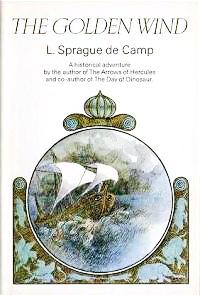
The Golden Wind is a historical novel by American writer L. Sprague de Camp, first published in hardcover by Doubleday in 1969, and in paperback by Curtis in 1972. The book was reissued with a new introduction by Harry Turtledove as a trade paperback and e-book by Phoenix Pick in July 2014. It is the fifth and last of de Camp's historical novels, both in order of writing and chronologically. The novel has also been translated into German.

Darwin and His Great Discovery is a science book for young adults by L. Sprague de Camp and Catherine Crook de Camp, first published by Macmillan in 1972.

The Day of the Dinosaur is a science book by L. Sprague de Camp and Catherine Crook de Camp, illustrated with plates. It was first published in hardcover by Doubleday in 1968, and in paperback by Curtis Books in 1970 or 1971. A second hardcover edition was issued by Bonanza Books in 1985. The first chapter was reprinted as "One Day in the Cretaceous" in the de Camps's collection Footprints on Sand.
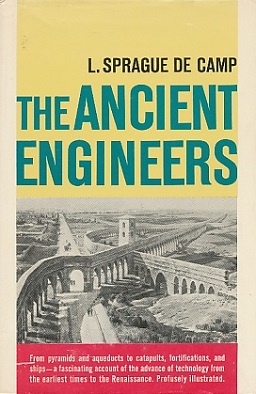
The Ancient Engineers is a 1963 science book by L. Sprague de Camp, one of his most popular works. It was first published by Doubleday and has been reprinted numerous times by other publishers. Translations into German and Polish have also been published. Portions of the work had previously appeared as articles in the magazines Fate, Isis and Science Digest.

Lovecraft: A Biography is a 1975 biography of the writer H. P. Lovecraft by science-fiction writer L. Sprague de Camp, first published in hardcover by Doubleday in February 1975.
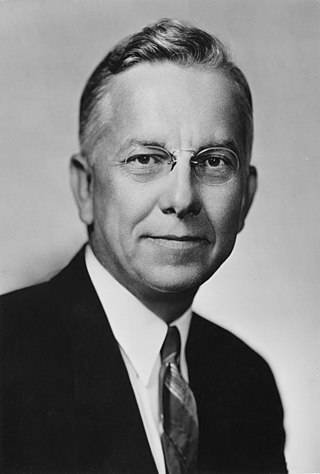
Kirtley Fletcher Mather was an American geologist and faculty member at Harvard University. An expert on petroleum geology and mineralogy, Mather was a prominent scholar, advocate for academic freedom, social activist, and critic of McCarthyism. He is known for his efforts to harmonize the dialogue between science and religion, his role in the Scopes "Monkey Trial", his faith-based liberal activism, support for adult education programs and advocacy for civil liberties.

Conan the Freebooter is a 1968 collection of five fantasy short stories by American writers Robert E. Howard and L. Sprague de Camp, featuring Howard's sword and sorcery hero Conan the Barbarian. Most of the stories originally appeared in the fantasy magazine Weird Tales in the 1930s. The book has been reprinted a number of times by various publishers, and has also been translated into German, Spanish, Portuguese, Dutch, Swedish, Italian, and Japanese. It was later gathered together with Conan and Conan of Cimmeria into the omnibus collection The Conan Chronicles (1989).

Conan is a 1967 collection of seven fantasy short stories and associated pieces written by Robert E. Howard, L. Sprague de Camp and Lin Carter featuring Howard's seminal sword and sorcery hero Conan the Barbarian. Most of the stories were originally published in various pulp magazines. The book was first published in paperback by Lancer Books in 1967, and was reprinted in 1968, 1969, 1970, 1971, 1972 (twice) and 1973. After the bankruptcy of Lancer, publication was taken over by Ace Books. Its first edition appeared in May 1977, and was reprinted in 1979, 1982 (twice), 1983, 1984, 1985, 1986, and 1990. The first British edition was issued by Sphere Books in 1974, and was reprinted in 1977. The book has also been translated into German, Japanese, French, Spanish, Italian, Swedish and Dutch. It was gathered together with Conan of Cimmeria and Conan the Freebooter into the omnibus collection The Conan Chronicles.
Edmund Duffy, was an American editorial cartoonist. He grew up in Jersey City, New Jersey, eventually moving to metropolitan areas. Duffy did not attend high school, but instead went into the Art Students League of New York. Duffy's career took him to London, Paris, New York, and finally to Baltimore, where he spent the majority of his professional career working for The Baltimore Sun.

"The Wheels of If" is an alternate history science fiction story by American writer L. Sprague de Camp. It was first published in the magazine Unknown Fantasy Fiction for October, 1940, and first appeared in book form in de Camp's collection The Wheels of If and Other Science Fiction. It later appeared in the paperback edition of the collection published by Berkley Books in 1970, in de Camp's subsequent collections The Virgin & the Wheels and Years in the Making: the Time-Travel Stories of L. Sprague de Camp, and in the anthology Unknown Worlds: Tales from Beyond. It also appeared, together with a sequel by Harry Turtledove, in The Pugnacious Peacemaker/The Wheels of If and Down in the Bottomlands and Other Places. The story has also been translated into German.
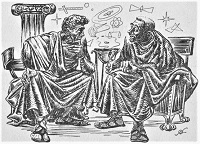
"Aristotle and the Gun" is a time travel and alternate history science fiction story by American writer L. Sprague de Camp.

"Judgment Day" is an apocalyptic science fiction story by American writer L. Sprague de Camp. It was first published in the magazine Astounding Science Fiction for August, 1955, and first appeared in book form in the anthology The Best Science Fiction Stories and Novels: 1956. It later appeared in the de Camp collections A Gun for Dinosaur and Other Imaginative Tales, and The Best of L. Sprague de Camp, as well as the anthologies Great Science-Fiction, A Science Fiction Argosy, and Masters of Darkness III. The story has also been translated into German.
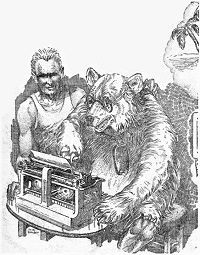
"The Command" is a science fiction story by American writer L. Sprague de Camp. An early treatment of the concept of uplift, it was the first in his Johnny Black series. It was first published in the magazine Astounding Science-Fiction for October, 1938, and first appeared in book form in the hardcover anthology Modern Masterpieces of Science Fiction. It later appeared in the paperback anthology Doorway Into Time and the subsequent de Camp collection The Best of L. Sprague de Camp. The story has also been translated into German.
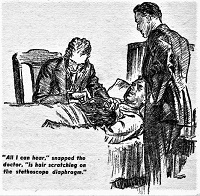
"Hyperpilosity" is a science fiction story by American writer L. Sprague de Camp. It was first published in the magazine Astounding Stories for April, 1938, and first appeared in book form in the de Camp collection The Wheels of If and Other Science Fiction (Shasta, 1949; It later appeared in the anthologies Omnibus of Science Fiction, Science Fiction of the Thirties, The Edward De Bono Science Fiction Collection, and The Road to Science Fiction #2: From Wells to Heinlein, as well as the magazine Fantastic Story Magazine and the de Camp collection The Best of L. Sprague de Camp. In 2014 the story was shortlisted for the Retro Hugo Award for Best Short Story.
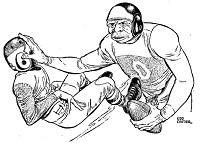
"Throwback" is a classic science fiction short story featuring atavism by L. Sprague de Camp. It was first published in the magazine Astounding Science Fiction for March 1949. It first appeared in book form in the collection A Gun for Dinosaur and Other Imaginative Tales ; it later appeared in the anthology Apeman, Spaceman. The story has been translated into Italian and German.
